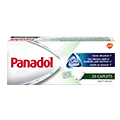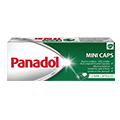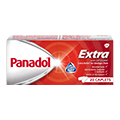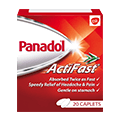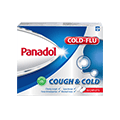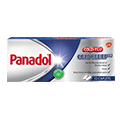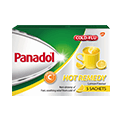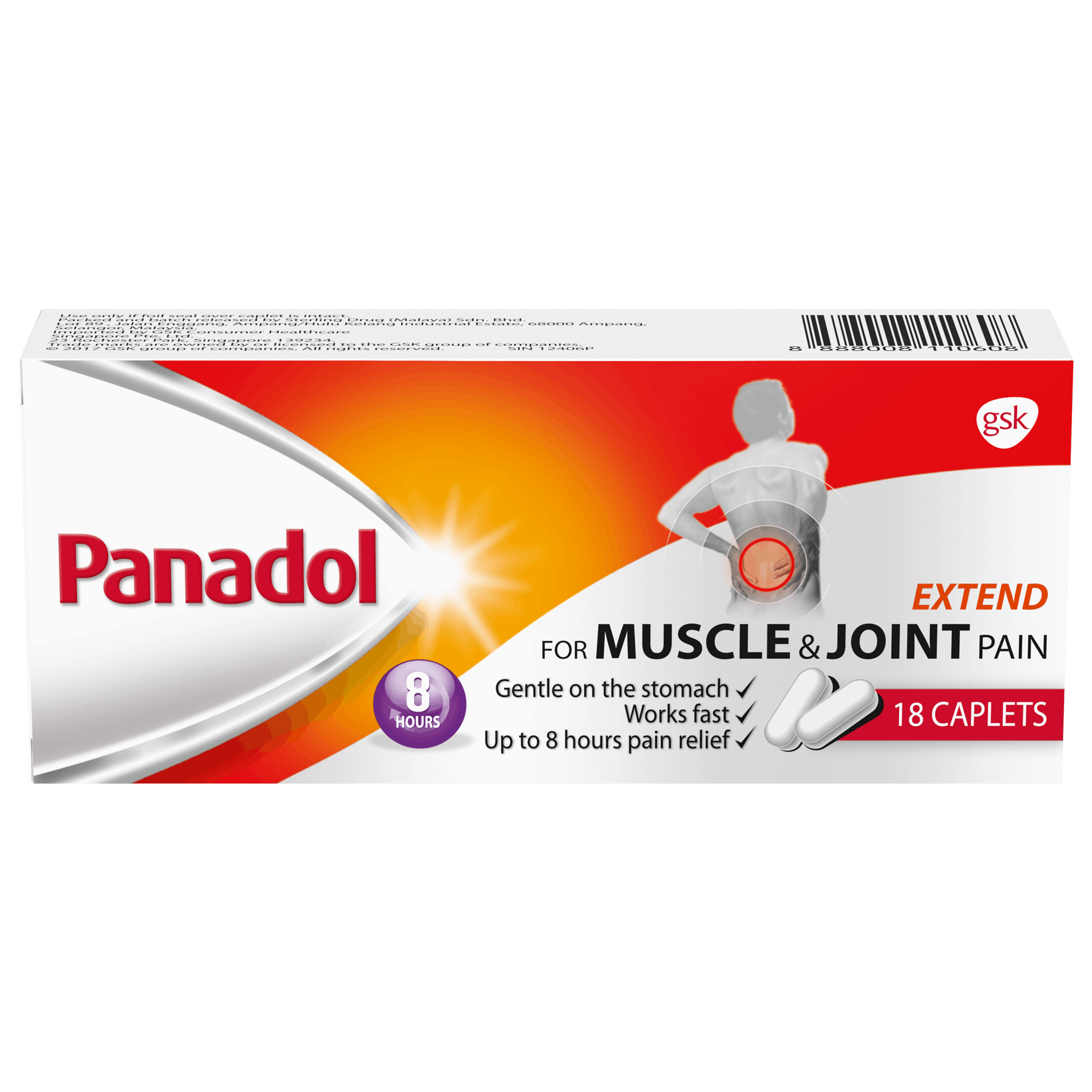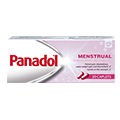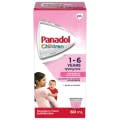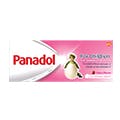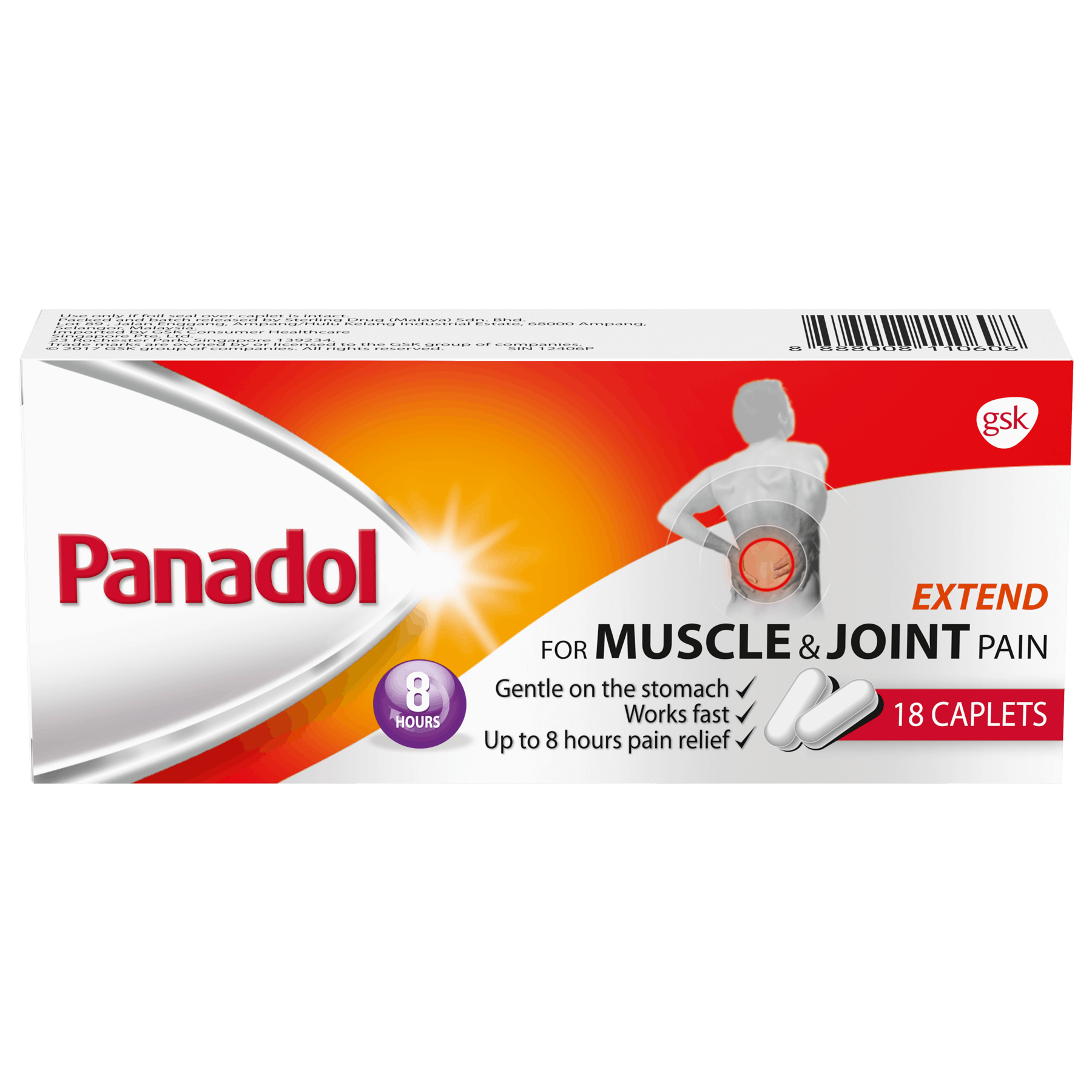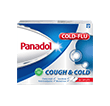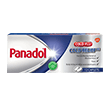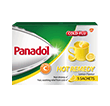

Panadol Children's Suspension 1-6 Years

Panadol Chewable Tablets

Panadol Children’s Suspension 1-12 Years

Panadol with Optizorb

Panadol Mini Caps

Panadol Soluble

Panadol Extra with Optizorb

Panadol ActiFast

Panadol Cold & Flu Hot Remedy

Panadol Cough & Cold

Panadol SinusMAX

Panadol Cold Relief PE

Panadol Extend

Panaflex Patch

Panadol Menstrual

Panadol Cold Relief PSE
Compare Now (0/5)
- Product
- Format
- Age
- Key Features
- Ingredients

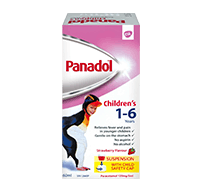
Panadol Children's Suspension 1-6 Years
- Suspension
- 1-6 Yrs
- Gentle on the Stomach
- Active Ingredient: 120 mg/5 ml Paracetamol
- No Alcohol.
- No Aspriin.

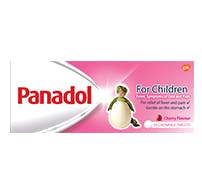
Panadol Chewable Tablets
- Chewable Tablets
- 2-12Yrs
- Gentle on the Stomach
- Active Ingredient: 120 mg Paracetamol

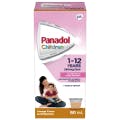
Panadol Children’s Suspension 1-12 Years
- Suspension
- 6 -12 Yrs
- Gentle on the Stomach
- Active Ingredient: 250 mg/5ml Paracetamol

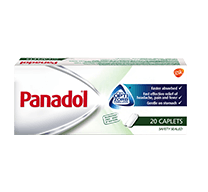
Panadol with Optizorb
- Caplets
- 12+ Yrs
- Quicker Absorption
- Active ingredient: 500mg Paracetamol

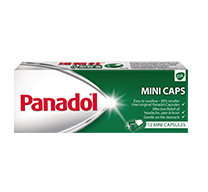
Panadol Mini Caps
- Caplets
- 12+ Yrs
- Easier to Swallow
- Active ingredient: 500mg Paracetamol
- No gluten, lactose or sugar

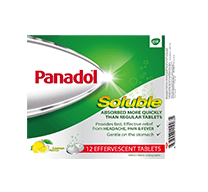
Panadol Soluble
- Effervescent Tablets
- 12+ Yrs
- Quicker Absorption
- Active ingredient: 500mg Paracetamol

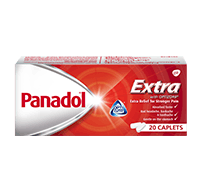
Panadol Extra With Optizorb
- Caplets
- 12+ Yrs
- Fights Tough Pain
- Active ingredient: 500mg Paracetamol, 65mg Caffeine

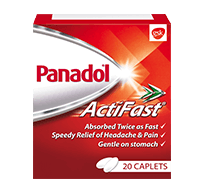
Panadol ActiFast
- Caplets
- 12+ Yrs
- Absorbed 2x Faster
- Active ingredient: 500mg of Paracetamol.

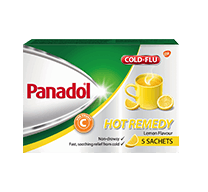
Panadol Cold & Flu Hot Remedy
- Powder Sachet
- 12+ Yrs
- Hot Drink
- Active ingredient: 750mg Paracetamol, 10mg Phenylephrine HCI, 60mg Vitamin C

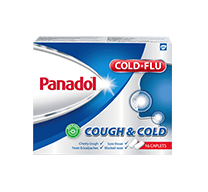
Panadol Cough & Cold
- Caplets
- 12+ Yrs
- Multi-Symptomatic Relief
- Active ingredient: 250mg Paracetamol, 5mg Phenylephrine HCI, 100mg Guaiphenesin

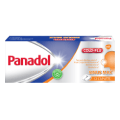
Panadol SinusMAX
- Caplets
- 12+ Yrs
- Sinus Pain
- Active ingredient: 500mg Paracetamol, 5mg Phenylephrine HCI

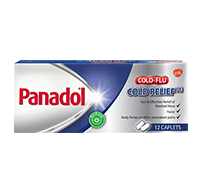
Panadol Cold Relief PE
- Caplets
- 12+ Yrs
- Relief of Cold & Flu Symptoms
- Active ingredient: 500mg Paracetamol, 5mg Phenylephrine HCI

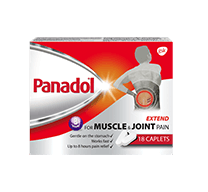
Panadol Extend
- Caplets
- 12+ Yrs
- Long-Lasting Relief
- Active ingredient: 665mg Paracetamol

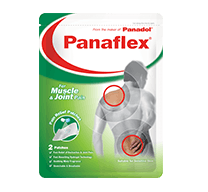
Panaflex Patch
- Patch
- 12+ Yrs
- Back Pain Remedy
- Active ingredient: 1.5% w/w Glycol Salicylate, 1.0% w/w L-Menthol, 0.5% w/w DL-Camphor, 0.3% w/w DL-α- Tocopherol Acetate (Vitamin E)

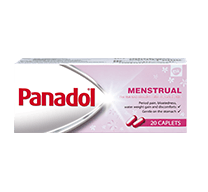
Panadol Menstrual
- Caplets
- 12+ Yrs
- Relief Period Pain
- Active ingredient: 500mg Paracetamol, 25mg Pamabrom

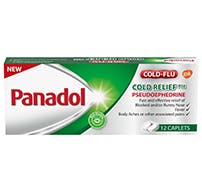
Panadol Cold Relief PSE
- Caplets
- 12+ Yrs
- Relief of Blocked and/or Runny Nose and Other Cold Symptoms
- Active ingredient: Paracetamol 500mg, Pseudoephedrine hydrochloride 30mg
Minimise

THE FLU JOURNEY
Most of us are familiar with the flu. However, amidst the hustle and bustle of life, it’s easy to lose track of the important steps we should take towards a quick recovery.
Here are some quick and easy tips to guide you along your flu journey, so that you can bounce back from your sickness and get on your feet quickly.
STEP 1: NOTICE THE SYMPTOMS
People with the flu often feel some or all of these symptoms:1
Fever
Chills
Cough
Sore throat
Runny or stuffy nose
Muscle or body aches
Headaches
Fatigue, which can be intense
Some people may have vomiting and diarrhoea, though this is more common in children.1
STEP 2: MANAGE YOUR SYMPTOMS
The flu is different from a cold and usually comes on suddenly.2 Flu symptoms typically affect your whole body including the lungs and should not be ignored.2,3 To learn about ways to manage your symptoms at home, click here.
Home remedies can be complemented with over-the-counter cold and flu medicines to reduce the intensity and severity of symptoms. Your pharmacist or doctor can help advise on the most appropriate treatments for you. If your symptoms persist or worsen, you should consult your doctor.
Some people are at high risk of flu-related complications, such as young children, adults older than 65 years of age, pregnant women and people with certain medical conditions.4 If you are at risk of complications or if you are worried about your illness you should see a doctor who can advise on appropriate treatment.4
HELP PREVENT THE SPREAD OF FLU VIRUSES

Wash your hands.4,5
Clean your hands thoroughly and often with soap and water. This is one of the most important ways to avoid getting sick and spreading germs to others. You should scrub your hands with soap for at least 20 seconds and remember to clean the back of your hands. If soap and water are not available, use an alcohol-based hand sanitiser. Teach your children the importance of hand-washing.

Keep surfaces clean.4
Clean kitchen and bathroom surfaces with disinfectant, especially when someone in your family has the flu. Wash children’s toys when needed.
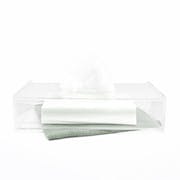
Use tissues.4
Sneeze and cough into tissues. Discard used tissues immediately, then wash your hands thoroughly. To make sure children cover their mouths without using their hands, you can teach them to sneeze or cough into the bend of their elbow. This is really important when they do not have a tissue.

Don’t share.4
Stay away from flu viruses. Avoid close contact with anyone who has flu and do not share drinking glasses or utensils with other family members.

Take care of yourself.6
Remember to stay hydrated and get plenty of rest while you recover.
FIND THE RIGHT FORMULA FOR YOU
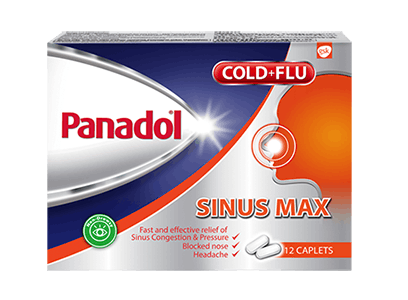
Panadol SinusMAX*
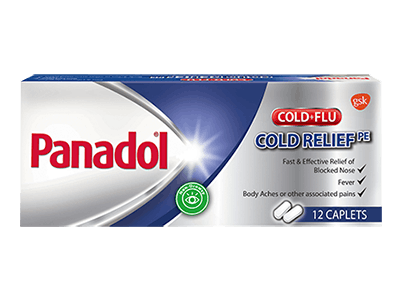
Panadol Cold Relief PE*
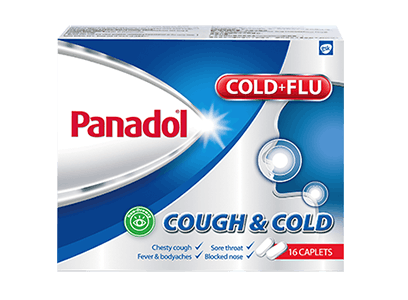
Panadol Cough and Cold*
*For more detailed information, please refer to the local product labelling or leaflet.
WHEN TO SEE A DOCTOR
As the flu may also cause more serious symptoms, here are some, but not all of the indications that you should see a doctor:7,8
1. You have difficulty breathing, feel short of breath, or are experiencing pain in the chest or abdomen.
2. You have a fever that does not go away, refuses to come down despite medication, or you have a fever with a rash.
3. Your symptoms (which may include fever, headache, nasal congestion, fatigue or cough) persist or get worse.
4. You have severe or persistent vomiting.
5. You experience sudden dizziness or confusion.
WHEN TO SEE A DOCTOR
As the flu may also cause more serious symptoms, here are some, but not all of the indications that you should see a doctor:7,8
1. You have difficulty breathing, feel short of breath, or are experiencing pain in the chest or abdomen.
2. You have a fever that does not go away, refuses to come down despite medication, or you have a fever with a rash.
3. Your symptoms (which may include fever, headache, nasal congestion, cough or fatigue) persist or get worse.
4. You have severe or persistent vomiting.
5. You experience sudden dizziness or confusion.
REFERENCES
1 Centers for Disease Control and Prevention. Flu symptoms and complications. Available at: https://www.cdc.gov/flu/about/disease/complications.htm. Last accessed: 27 March 2018.
2 Centers for Disease Control and Prevention. Cold versus flu. Available at: https://www.cdc.gov/flu/about/qa/coldflu.htm. Last accessed: 20 March 2018.
3 Mayo Clinic. Influenza (flu). Available at: https://www.mayoclinic.org/diseases-conditions/flu/symptoms-causes/syc-20351719. Last accessed: 29 March 2018.
4 Centers for Disease Control and Prevention. Influenza (flu): Preventative steps. Available at: https://www.cdc.gov/flu/consumer/prevention.htm. Last accessed: 27 March 2018.
5 Centers for Disease Control and Prevention. Handwashing. Available at: https://www.cdc.gov/handwashing/when-how-handwashing.html. Last accessed: 03 April 2018.
6 Mayo clinic. Self-care for the Flu. Available at: https://www.mayoclinic.org/diseases-conditions/swine-flu/expert-answers/swine-flu-symptoms/faq-20058379. Last accessed: 29 March 2018.
7 Centers for Disease Control and Prevention. The Flu: What to do if you get sick. Available at: https://www.cdc.gov/flu/takingcare.htm. Last accessed: 23 March 2018.
8 Mayo Clinic. Fever treatment: Quick guide to treating a fever. Available at: https://www.mayoclinic.org/diseases-conditions/fever/in-depth/fever/art-20050997. Last accessed: 29 March 2018.

